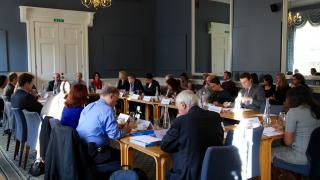
Government representatives, UN officials, and civil society experts convened in London on Tuesday 22 November for a high-level roundtable discussion on strengthening the UN's 'forgotten pillar' - the Human Rights Council.
Hosted by UNA-UK in partnership with Geneva-based think tank Universal Rights Group at King's College London, the roundtable considered the major successes and failures of the Human Rights Council over the past ten years of its existence, before identifying areas where the UK Government could take a proactive role in pushing for reform.
The UK Government was represented by Robert Fenn, Head of the Human Rights and Democracy Department at the Foreign and Commonwealth Office, and Bob Last, Deputy Head of the UK Mission to the United Nations in Geneva. Representing the Office of the UN High Commissioner for Human Rights (OHCHR) were Eric Tistounet, Chief of Human Rights Council Branch, and Nathalie Rondeux Human Rights Officer, Special Procedures Branch.
Chaired by Lord Hannay of Chiswick, the first session was a stock-taking exercise of the Human Rights Council's effectiveness. Participants noted that the Council has seen some major successes since its creation in 2006, such as the development of the Universal Periodic Review, which enables all UN member states to be reviewed on their human rights record. Civil society engagement at Geneva was also widely regarded as a success, particularly in comparison to the limited points of access for NGOs at the UN headquarters in New York.
In the second session, under the chairmanship of UNA-UK's Executive Director, Natalie Samarasinghe, participants considered whether, in light of recent domestic developments, the UK was in a suitable position to take the lead in strengthening the UN's human rights pillar. Civil society representatives welcomed the UK's leadership on key thematic issues at the Council, such as modern slavery and violence against women and girls. Other participants congratulated the UK on its recent re-election to the Human Rights Council, and noted the vital role that it recently played in ensuring the mandate of the UN Independent Expert on Sexual Orientation and Gender Identity.
However, re-appointment to the UN's main intergovernmental human rights forum comes with a deeper responsibility to set a positive example to other states, and many participants expressed concern over the UK's increasingly negative rhetoric on human rights at the national level. Examples included UK Government language on seeking to exempt the armed forces from legal action under the European Court of Human Rights, as well as verbal attacks by Government officials on UN Special Rapporteurs during their visits to the UK.
Participants noted that there are areas where the UK's performance on the Human Rights Council could be improved. For example, questions were raised about the UK's opposition to Council resolutions on strengthening regulations for the use of armed drones, as well as its silence on alleged violations of international humanitarian law committed by the Saudi-led coalition in Yemen.
Such behaviour risks undermining international perceptions of the UK as a global leader on human rights, and could result in 'copycatting', whereby other states disregard their human rights obligations, pointing the UK as a example. Improving the domestic debate on human rights - as well as setting a positive example on the Council - would strengthen the UK's legitimacy as a global leader on human rights and preserve its influence at the United Nations.
Chaired by Marc Limon, Executive Director of Universal Rights Group, the final session enabled participants to formulate a series of concrete and practical recommendations for Human Rights Council reform. These recommendations will be incorporated into a policy report, which will be circulated to the UK Foreign and Commonwealth Office, the UN High Commissioner for Human Rights, and all members of the Human Rights Council.
The final report will also be available on the UNA-UK website.
In preparation for the roundtable event UNA-UK produced a think piece document for speakers, providing a background on the progress of the Human Rights Coucil and outlining the main issues to be discussed. The document is available here.
Image: UNA-UK




